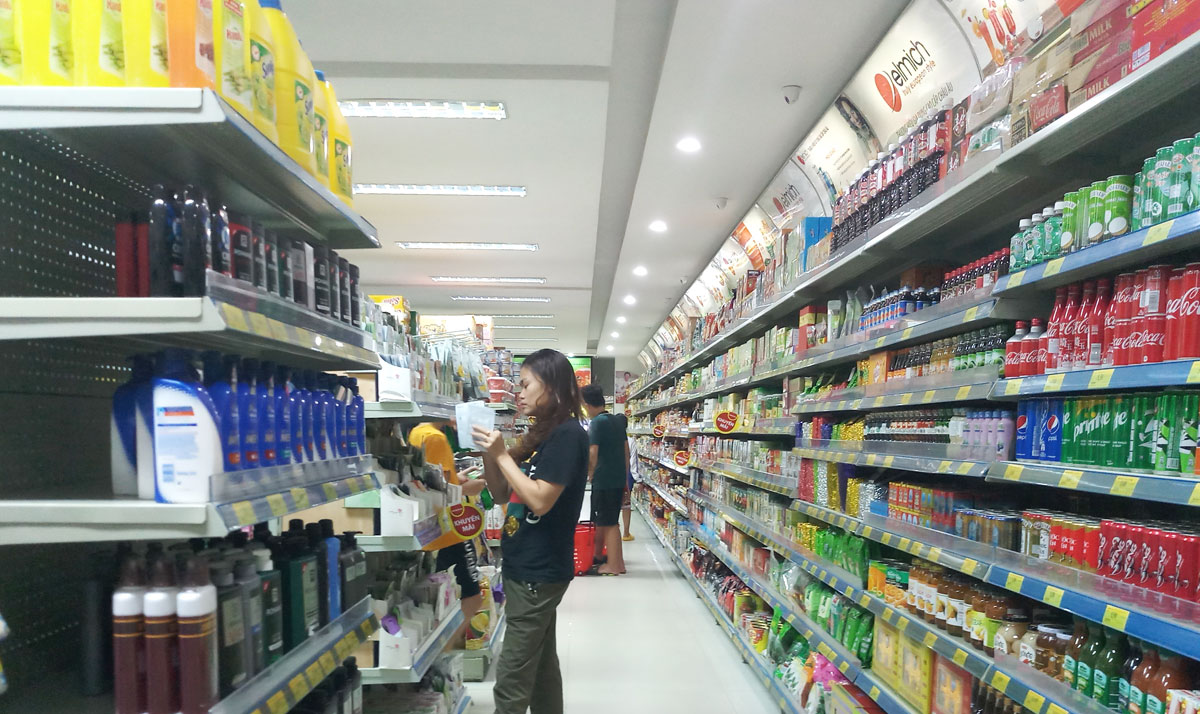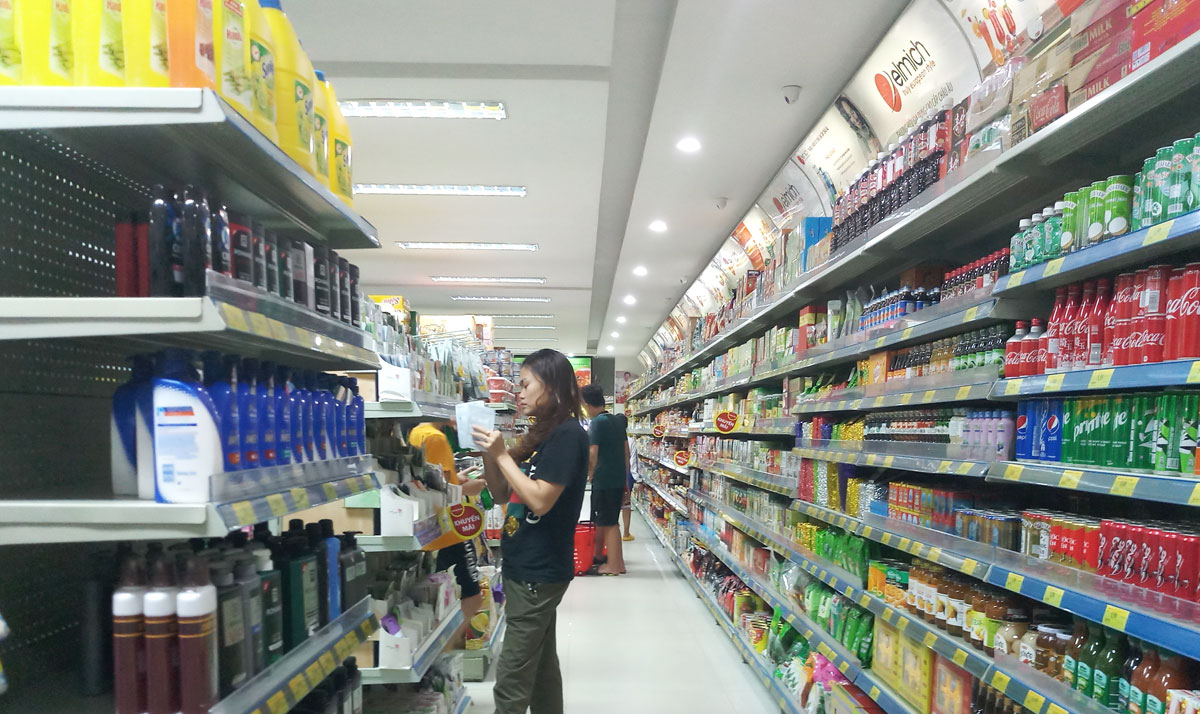
(HBO) - Hoa Binh province has seen considerable progress in the service sector which has not only met local residents’ demand but also created jobs and contributed significantly to the province’s economic development.
 The
number of supermarkets, a new modern retail model, in Hoa Binh has been on the
rise. A woman goes shopping at AP Plaza in Hoa Binh City.
The
number of supermarkets, a new modern retail model, in Hoa Binh has been on the
rise. A woman goes shopping at AP Plaza in Hoa Binh City.
From 2016 – 2020,
the province’s Gross Regional Domestic Product (GRDP) grew at an average pace
of 6.36 percent annually, with the services sector expanding 5.91 percent. The
service sector’s output exceeded 15.84 trillion VND in 2020, up 71.6 percent
from 2016. Post, telecommunications, tourism, transport and distribution were the
fastest-growing sub-sectors, largely contributing to the service industry.
The provincial
People’s Committee has adopted a master plan on developing commerce by 2025,
with a vision to 2030. The province’s commercial activities have also expanded
substantially over the past years, with a boom in modern commerce models and
robust development of infrastructure in the sector. A number of traditional markets
have been built and renovated while supermarkets, shopping malls and
convenience stores are gaining increasing favour from local customers. This has
boosted the growth of the distribution service in the province.
Total retail sales
of goods and services increased 19 percent on average year on year to 37.68
trillion VND in 2020, 2.36 times higher than that of 2015. Foreign trade rose
by 28.5 percent every year, with exports and imports surging 30 percent and 27
percent per year, respectively.
The province has
also witnessed the robust growth of tourism, reflected by remarkable
improvements in the diversity and quality of tourism services.
"Previously, all I
knew about Hoa Binh were Hoa Binh Reservoir and Lac village (Mai Chau district),”
said Lam Oanh, a visitor from Bac Giang province’s Hiep Hoa district, adding
that now she knows there are more to explore in the province.
She was
particularly impressed with community-based and eco-tours in popular
destinations, such as Ngoi Hamlet (Tan Lac district); and Ke and Duc Phong
Hamlets (Da Bac), as well as the boom of newly-built luxurious lodging
facilities, including Mai Chau Ecolodge, Bakhan Village and Serena Resort.
Currently, the
province is housing 434 lodging facilities, nine local-level tourist sites at
local level, and one provincial-level tourist site. Additionally, Hoa Binh Lake
has been planned as a national tourist area.
Along with tourism, transport services have developed in recent time,
facilitating travel and transport of goods. There are 204 firms, cooperatives
and individual business households running transport business with more than
2,820 vehicles, four times higher than the amount recorded at the beginning of
2016.
Transport of passengers has surged on average 8 percent per year, while that of
goods picks up 9 percent.
Three companies are providing bus services, with over 100 vehicles that operate
14 hours per day on five routes. In the meantime, taxi services are offered
around the clock by 13 firms who have nearly 1,190 vehicles.
In recent years, healthcare, education-training, banking, and
information-communication services have met increasing demands of the local
residents. They have made up 30.4 percent of the province’s economic structure.
However, the service sector has not been developed on par with the province’s
potential and strengths.
At a recent meeting of the provincial People’s Committee on service development
orientations for the 2021-2025 period, Director of the provincial Department of
Industry and Trade Pham Tien Dung pointed out that the service sector made
humble contributions to the locality’s economic growth and job generation.
Besides ununiformed development of infrastructure, the sector has seen
restrictions in planning and state management, he said, adding value chains and
attractive products and services have not been shaped up while the province is
in short of projects that can create breakthroughs for the service sector.
Under the resolution adopted at the 17th provincial Party Congress, Hoa
Binh identified development and diversification of high-quality services that
meet local people’s production and consumption as its key mission in the
2020-2025 tenure.
The action programme No.1, issued by the provincial Party Committee on December
23, 2020, set a target of developing service into an important economic sector
which can contribute greatly to the local economy and growth.
The provincial Party Committee is directing competent authorities to build the
service sector development project during 2021-2025, expecting the service
sector to develop on par with local potential and strengths. The move aims to
reduce poverty in a sustainable manner, promote industrialization and modernisation
process, and spur the province’s social economic development./.
According to data from the Hoa Binh Provincial Party Committee, the industrial production index for the first six months of 2025 is estimated to have increased by 20% compared to the same period last year. This marks the highest year-on-year growth rate for this period since 2020.
In the first six months of 2025, Hoa Binh province’s export turnover was estimated at 1.145 billion USD, marking an 18.11% increase compared to the same period in 2024. Import turnover was estimated at $ 804 million, a 17.15% increase, which helped the province maintain a positive trade balance.
The lives of the ethnic minority farmers in Tan Lac district have gradually improved thanks to the new directions in agricultural production. This is a testament to the collective strength fostered through the professional associations and groups implemented by various levels of the district’s Farmers’ Union.
With the motto the "product quality comes first,” after nearly one year of establishment and operation, Muong village’s Clean Food Agricultural and Commercial Cooperative, located in Cau Hamlet, Hung Son Commune (Kim Boi district), has launched reputable, high-quality agricultural products to the market that are well-received by consumers. The products such as Muong village’s pork sausage, salt-cured chicken, and salt-cured pork hocks have gradually carved out a place in the market and they are on the path to obtaining the OCOP certification.
In the past, the phrase "bumper harvest, rock-bottom prices" was a familiar refrain for Vietnamese farmers engaged in fragmented, small-scale agriculture. But today, a new spirit is emerging across rural areas of Hoa Binh province - one of collaboration, organisation, and collective economic models that provide a stable foundation for production.
Maintaining growing area codes and packing facility codes in accordance with regulations is a mandatory requirement for agricultural products to be eligible for export. Recently, the Department of Agriculture and Environment of Hoa Binh province has intensified technical supervision of designated farming areas and packing facilities to safeguard the "green passport" that enables its products to access international markets.



 The
number of supermarkets, a new modern retail model, in Hoa Binh has been on the
rise. A woman goes shopping at AP Plaza in Hoa Binh City.
The
number of supermarkets, a new modern retail model, in Hoa Binh has been on the
rise. A woman goes shopping at AP Plaza in Hoa Binh City.